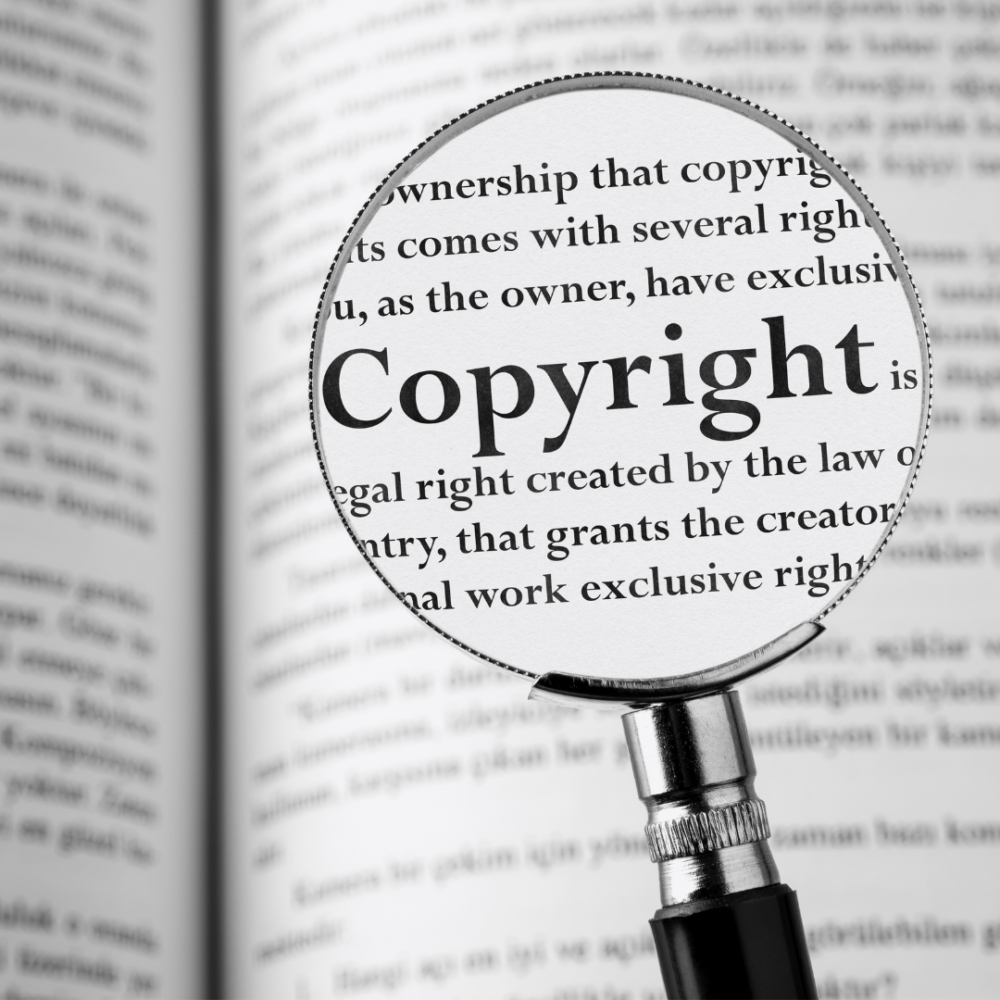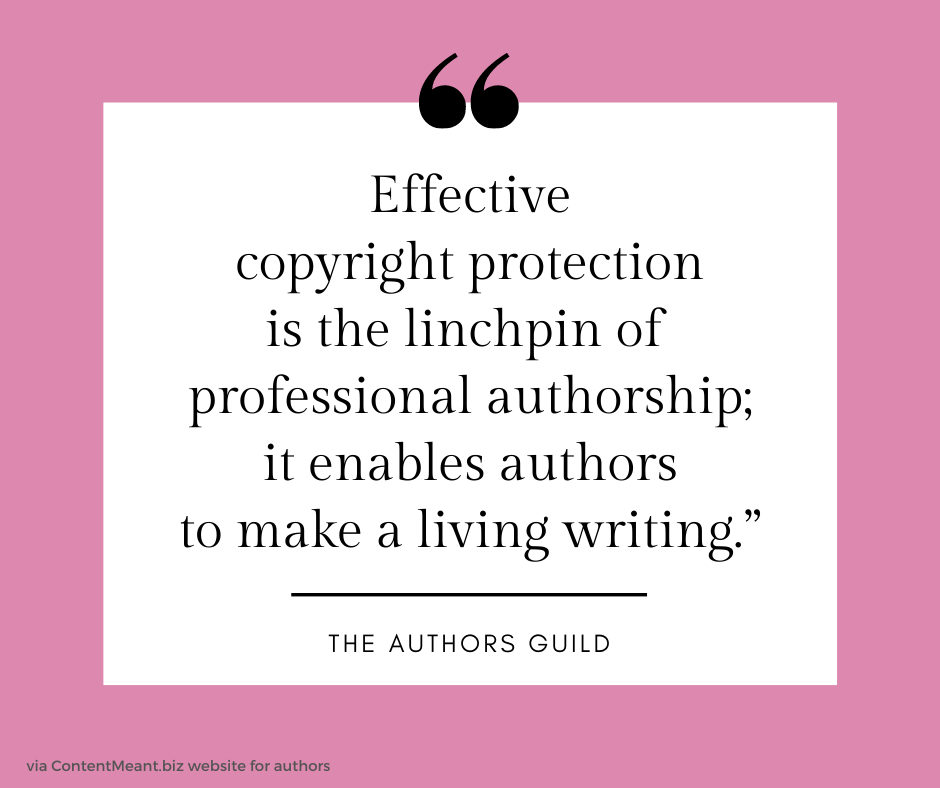
Copyright is extremely important to authors because it constitutes the ownership of one’s original work. The legal fact of copyright enables you protect your work as intellectual property, yours to manage and — ideally — yours to profit by.
Here are some frequently asked questions about copyright.
What is copyright and why is important to authors and other creators?
According to the U.S. government, “Copyright is a form of protection grounded in the U.S. Constitution and granted by law for original works of authorship fixed in a tangible medium of expression.” The word “fixed” means that a written novel is under copyright protection even if it’s not published. Once “fixed” (aka written), the idea of the novel becomes a fully formed creative expression of the author.
So, importantly, as the Authors Guild puts it, “Effective copyright protection is the linchpin of professional authorship; it enables authors to make a living writing.”
And, having copyright ownership means you can protect your work as intellectual property and control who makes money from it — ideally you and those to whom you assign rights in a contract, like a book publisher, translator, film producer, etc.

How do I know for absolute certain that my intellectual property is being legally protected, especially with so much digital piracy going on around the world?
It’s true that piracy is rampant. There are plenty of unethical people who are looking to make a buck from books or other content that isn’t rightfully theirs to sell. And piracy has been around long before the digital age (Charles Dickens used to complain about the unauthorized American copies of his work — now we complain about China).
In the United States, copyright protects your work — published or not — from misuse by others within the country. Each nation has its individual copyright laws, and many respect each other’s rules — though some most certainly do not.
For better or for worse, though — in the case of emerging writers, the truth is also that you don’t have to worry that much. Most pirates won’t bother with stealing your work unless you’re making a lot of money on your intellectual property. Cyber criminals of any kind are looking to make a quick buck; IP stealers won’t make money on unknowns.
That being the case, be cautious when sending out your work. Some steps to take include:
- Use a secure portal to transfer documents (hopefully your publishing company or DIY service has one); at the very least, send a PDF which is harder (though becoming easier) to change.
- Place a copyright notice on any unpublished manuscript copies before they are sent out, per U.S. Copyright office. Even though protected by law, a reinforcing notice doesn’t hurt. For example, something like: Where the House Plants Grow (working title); unpublished work © 2022 Jade Succulent).
- Register your work with the U.S. copyright office, for the extra protection it provides.
I’ve heard you can’t copyright the title of a book — is that true?
Yes, it’s true you can’t copyright a book title. Book titles are among the things that cannot be copyrighted, which include names, titles, slogans, or short phrases. (Read more about book titles here.)
How do others know that I’m the copyright holder of my books?
The copyright holder or holders are cited on the copyright page of your book. The copyright page most often appears at the front of a book although sometimes it appears in the back.
Note that even if you wrote the book, if your book might contain elements for which you don’t own the copyright (and, therefore, don’t have the right to use without limits). For example, for original photos or artwork that isn’t “work for hire”, the copyright might be held by the original photographer or artist. (In the instance of my and Janice Fryer’s Cookie Craft copyright page (below), you’ll see that the whimsical illustrator Sophie Blackhall and the photographer Ellie Miller Studio own copyrights to their work.)

Who registers the copyright for my book?
If you are being published by a traditional book publisher, your publisher takes care of registering your copyright. If you are an indie author, you should consult your specific DIY publishing service to make sure that copyright registration for you is part of their service (and you should make sure your agreement with them gives you copyright).
Okay, so I have copyright of my book. Where does that leave my publisher?
As the copyright holder, you assign certain rights to your book publisher and, in return, are given a percentage of the proceeds of the books sales. These assignments of rights and fees are spelled out very specifically in your book contract and — because they dictate how you are paid for your work — you should be familiar with and understand the clauses.
So, are U.S. copyright laws set in stone?
Good question. Like many legal protections we’ve taken for granted, they are subject to attack and change by those who would most benefit (hint: not authors). And there are movements afoot to take a fresh look at what some consider antiquated laws that now benefit large corporations vs. the creators. Take heart that organizations which protect creators, such as the Author’s Guild, work diligently to protect fight for laws to protect copyright.
Copyright postscript
Especially if you’re a writer or creator, for the sake of your own Art Karma, do your part to respect the intellectual property rights of others. Every time you buy a bootleg copy of something that’s available by legitimate means or use another creator’s work outside of “fair use” or without appropriate permissions, credit and/or payments, you help damage all writers and artists’ ability to make a living.
Notes: I’m a writer with publishing expertise, not a lawyer or an agent; this blog post is not in any way a substitute for legal advice. Before signing a contract and/or to fully understand your own copyright situation, contact a qualified attorney. Also, consider joining the Authors Guild; the AG offers legal services for several thresholds of members, including to those writers who are self-published.
Dear thank you very much will you print and publish my new sipiriial book
Hi, Gloria – sorry for the delay in responding but we’re not a book publisher. Good luck on your publishing journey.
Hello peterson dear request for guidance how my book be printed and published